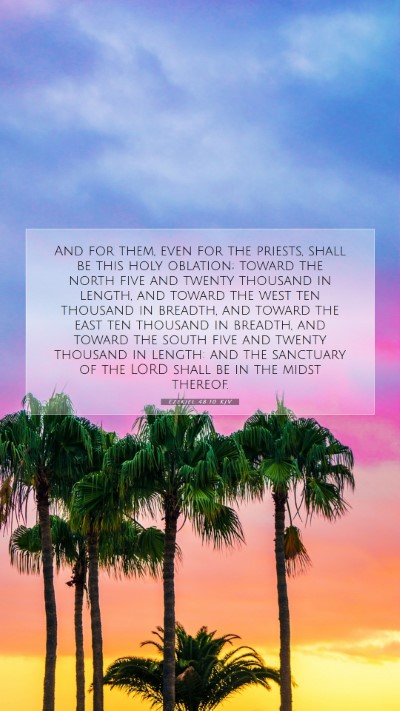Bible Verse Commentary on Ezekiel 48:10
Introduction
Understanding Scripture can often lead to deeper insights into the Word of God. The verse Ezekiel 48:10, part of the prophetic narrative of Ezekiel, offers rich interpretations and understanding of biblical themes through its depiction of geographical divisions among the tribes of Israel.
Verse Context
Before exploring the detailed meaning of this verse, it is essential to grasp its context within the book of Ezekiel. Chapter 48 concludes the prophet’s messages regarding the restoration of Israel and the detailed layout of the land after their return from exile.
Bible Verse Meaning
The scripture reads:
"And for the rest of the tribes: from the east side unto the west side, Benjamin shall have a portion." (Ezekiel 48:10)
Primary Interpretations
-
Land Division: This verse highlights the allocation of land to the tribe of Benjamin. Just as other tribes receive their designated areas, Benjamin is emphasized, possibly indicating its special status or role in future Israel.
-
Symbolism of Benjamin: Benjamin, being the youngest son of Jacob, often reflects themes of protection and blessing. The mention of this tribe might indicate God's faithfulness in the preservation and restoration of all tribes.
Biblical Exegesis
-
God's Promise: The allocation of land symbolizes God's promise of a homeland to His people, serving as a reassurance of His covenant with them. This reflects on the broader theme of hope and redemption in Scripture.
-
Order and Unity: The structured division of land can be interpreted as a call for unity among the tribes. Each tribe's distinct portion signifies their importance in the community, underscoring the need for collaboration among God's people.
Commentaries Insights
Various commentaries provide unique perspectives on this verse:
-
Matthew Henry: Highlights that the exact division of the land serves to illustrate that God has specific plans for each tribe. He notes the importance of recognizing that God's order should not be overlooked.
-
Albert Barnes: Discusses how the tribal distributions are crucial for fulfilling God’s promises to Israel, emphasizing both historical and theological implications of land ownership in the context of ancient Israel.
-
Adam Clarke: Points out the significance of Benjamin's inheritance, suggesting it symbolizes divine favor and the potential for future spiritual leadership among the tribes, linking it to Christ's lineage, as Jesus emerged from the tribe of Judah, which is close to Benjamin.
Application of the Verse
To gain a profound understanding of Ezekiel 48:10, we must consider its application to contemporary life and faith:
-
Personal Inheritance: Just as tribes received their portions, believers are called to recognize their spiritual inheritance in Christ and the unique roles they play in the body of Christ.
-
Embracing Unity: The division of land among tribes encourages us to embrace our differences while fostering unity within the church. Every member, regardless of background, possesses intrinsic value and purpose.
-
Hope and Restoration: This passage reassures believers of God's ongoing faithfulness. It encourages embracing hope, knowing God’s restorations are part of His grand narrative of salvation.
Related Cross References
- Jeremiah 3:18 - Discusses the return of Israel and the designation of land among the tribes.
- Numbers 34:13 - The Lord commands the allocation of land to the people of Israel.
- Joshua 14:1 - Describes the division of the land among the tribes as per the command of Moses.
Conclusion
Through careful analysis of Ezekiel 48:10, the verse unveils layers of meaning linked to God's faithfulness, the importance of community unity, and personal application of biblical promises. By studying this verse and its commentary, one can deepen their understanding of biblical themes, emphasizing that every aspect of Scripture serves a purpose in revealing God's character and His plans for humanity.


